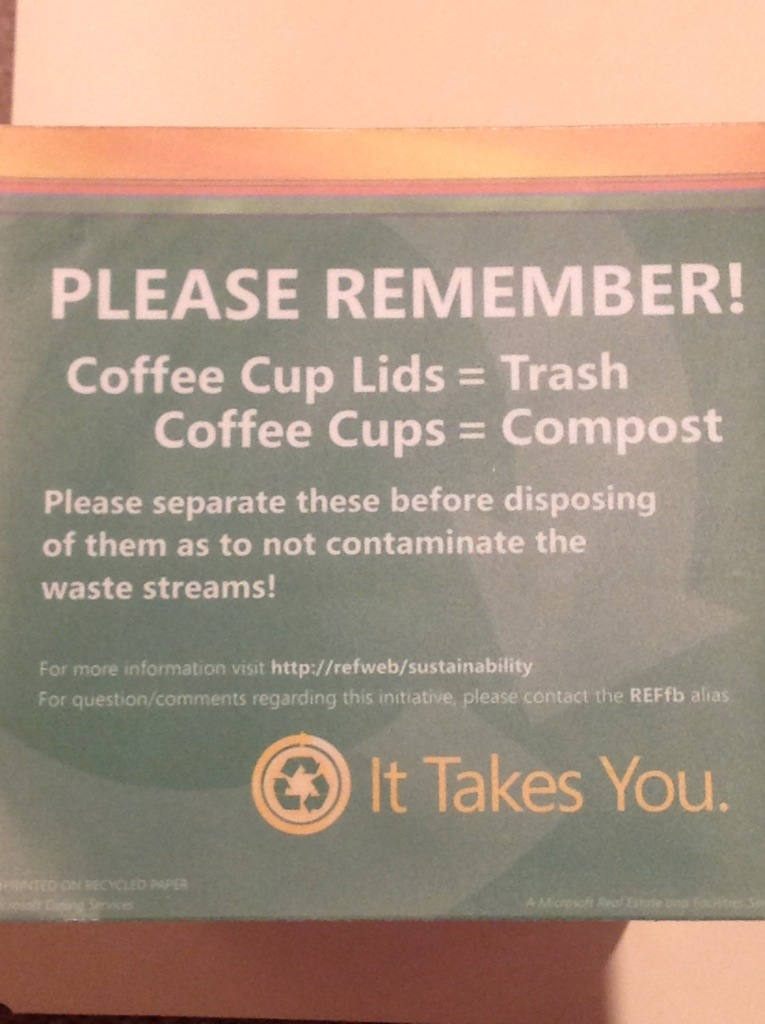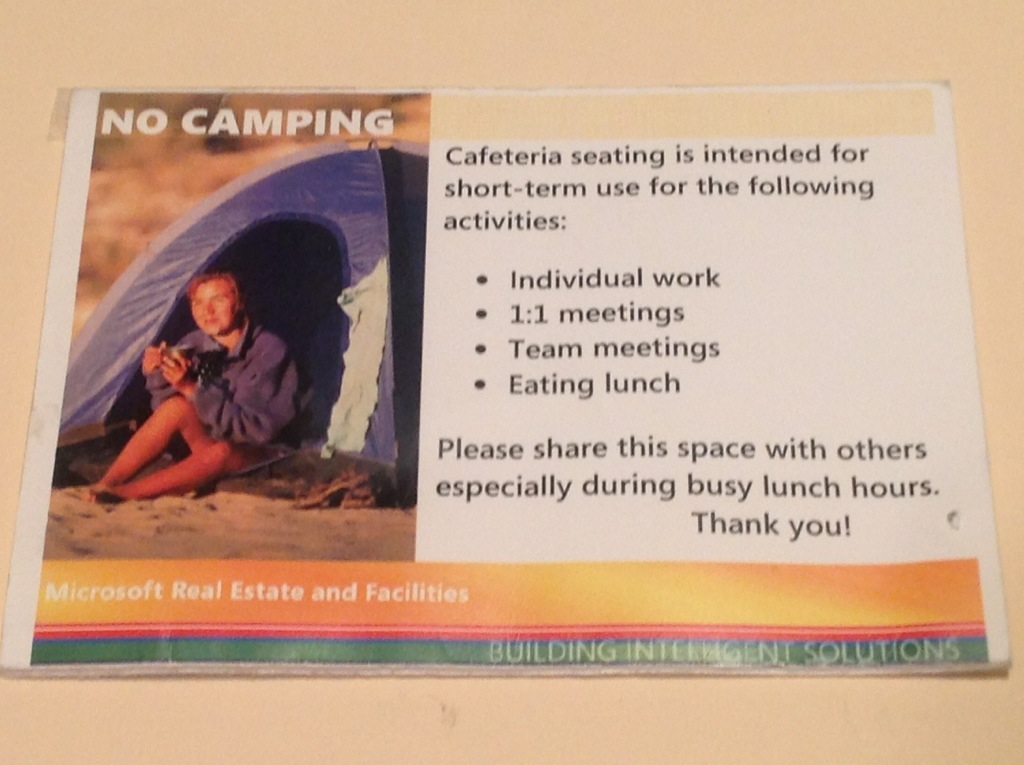Why Microsoft Hired Garbage Police And Forbid Camping
Rita, what are you doing?
I’m the Recycle Monitor.
The what? What does a Recycle Monitor do?
I. . .just a second. . .Bill, the coffee lids aren’t compostable. They go in the non-recycle trash, the plates, cups and utensils go into the compostable. Left over food? Ah. . .yeah, I think that’s compostable. What was your question, Rodney?
Never mind.
Microsoft is a very image conscious company. Being based in Washington, “the Evergreen State,” they take “green” issues very seriously. In 2008 they decided it was time to take additional steps to reduce their carbon footprint, although no one was calling it that yet.
They replaced all of the styrofoam cups and plates with something called “compostable” alternatives. They were made from corn starch extracts or something. Unlike the Dixie cups you buy at the store, these new cups had no wax coating.
They also replaced the plastic utensils with compostable alternatives. I know it sounds crazy, but the forks, knives and spoons were made from cardboard, well cornboard. For the most part the new stuff worked great with two exceptions. Shortly after the cups and things were introduced they had to send a company-wide email.
We hope you enjoy the new compostable cups, plates and utensil. Some of you have expressed concern with the cups. If you leave liquid in the cups for an extended period of time, they will weaken and sag. However, the manufacture assures us that they will not leak.
However, you should not leave the spoons immersed in liquid, especially hot liqued like coffee. They will eventually dissolve.
We didn’t complain too much. After all, Microsoft provides free pop, tea, coffee, juice and milk to it’s employees and contractors. You do still have to pay for your own meals, it’s not Google!
The introduction of new plates and cups introduced a recycling problem. Anyone who’s ever attempted to get rid of a day old pizza box knows you don’t put food into the recycle, it will contaminate it. Well, when the cups are compostable you put them, together with the plates and utensils and food scraps into a “compostable” container. But, you CANNOT put plastic into the compostable bins. That would contaminate them.
It got very confusing. So confusing in fact, that Microsoft assigned people to stand in the cafeterias and instruct some of the most brilliant programmers in the world on how to sort their garbage. Personally, I started eating off-campus more.
In the kitchens and breakrooms, they couldn’t assign monitors so they put up these signs.
Yes, it actually warns against “contaminating the waste streams.” And you thought it was just garbage!
Speaking of the cafeterias, Microsoft placed the following on each table in the cafeteria.
The issue was contractors and office space. There were too many of the first and not enough of the second. As a contractor, I was expected to provide my own phone and my own laptop. That’s fairly standard. But office space was at such a premium that every fulltime Microsoft employee in our group was already sharing an office. There were no spare offices for contractors. We would set up shop wherever we could find an electrical outlet and a chair.
Naturally the cafeteria was a popular location. It had power, wifi and snacks! But, in addition to the garbage monitors, Microsoft had people whose job was to shoo the contractors out of the cafeteria and the conference rooms, and even the casual areas.
We were often the highest paid people in the building and we would have to setup in hallways with our laptop perched on our knees at times. The best solution was if someone was on vacation, you’d camp in their office. It was considered good manners to ask them first, but if not, make sure you put everything back exactly as you found it!
In Microsoft’s defense they were building as quickly as they could and having more people than offices is a much better problem than the opposite.
This is the last post for the week devoted to consulting and a few funny Microsoft stories.
Monday: Un-Book Review. . .Purple Crayon Club
Tuesday: On Being a World Expert
Wednesday: 42 is gone but not forgotten. . Jackie Robinson and Mariano Rivera
Thursday: Overplaying a Recommendation (This one still makes me cringe to think about it.)
Friday: No Camping . . .But the place I saw the sign will surprise you
…and Don’t Pollute The Waste Streams. . .Not all garbage is created equal
About the author
Rodney M. Bliss is an author, blogger and IT consultant. He lives in Pleasant Grove, Utah with his lovely wife and 13 kids, all of whom have been instructed to never contaminate the waste streams.
Follow him on
Twitter (@rodneymbliss)
Facebook (www.facebook.com/rbliss)
LinkedIn (www.LinkedIn.com/in/rbliss)



“Don’t cross the streams” is M$ company policy? Mind == blown.
LOL . I never realized garbage was so complicated.